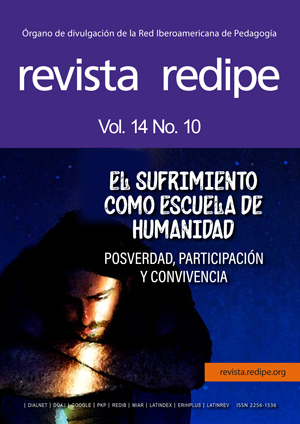Tecnologías en la enseñanza de lenguas étnicas: Una revisión bibliográfica con enfoque hacia el criollo San Andresano (kriol) de San Andrés, providencia y Santa Catalina, islas
##plugins.themes.bootstrap3.article.main##
Keywords
Criollo, Tecnologías, Revisión bibliográfica, Enseñanza
Resumen
La enseñanza de lenguas minoritarias enfrenta retos significativos en su preservación y transmisión, especialmente en comunidades multilingües como la del archipiélago de San Andrés, Providencia y Santa Catalina Islas. Este artículo aborda la implementación de tecnologías avanzadas en la enseñanza del criollo San Andresano (kriol), destacando su potencial para preservar este valioso patrimonio cultural. A través de una revisión bibliográfica y un análisis bibliométrico, se identificaron herramientas como la inteligencia artificial, la realidad aumentada y plataformas educativas digitales que facilitan aprendizajes inmersivos, personalizados y culturalmente contextualizados. Este enfoque menciona modelos de enseñanza innovadores que integran la tecnología con la pedagogía, fomentando no solo la adquisición lingüística, sino también la valorización cultural. El artículo presenta recomendaciones clave para diseñar estrategias educativas efectivas que promuevan la sostenibilidad del Kriol en un mundo globalizado.
Referencias
Alharbi, K., & Khalil, L. (2023). Artificial intelligence (AI) in ESL vocabulary learning: An exploratory study on students and teachers’ perspectives. Migration Letters, 20(S12), 1030-1045. https://doi.org/10.369743021
Almelhes, S. (2023). A review of artificial intelligence adoption in secondlanguage learning. Theory and Practice in Language Studies, 13(5), 370-387. https://doi.org/10.17507/tpls.1305.21
Archer, D., Brown, P., & Lee, M. (2023). Emerging technologies in second language education: A global perspective. Journal of Educational Technology, 45(2), 123-138. https://doi.org/10.1016/j. jet.2022.12.001
Barah, C. I., Nnenna, U. J., & Kiu Publication Extension. (2024). Personalized language education in the age of AI: Opportunities and challenges. Nigerian Journal of Research in Education, 411-434. https://doi.org/10.59298/ NIJRE/2024/41139448
Bartens, A. (2021). The making of languages and new literacies: San Andrés-Providence Creole with a view on Jamaican and Haitian. Lingüística y Literatura, 79, 237-256. https://doi.org/10.17533/udea. lyl.n79a13
Cai, J., Wang, S., & Zhang, X. (2024). From English learning in classroom to living in the English-speaking country: The impact of virtual reality technology on learners in college English class. In Exploring SocioCultural Dynamics and Sustainable Solutions in a Changing World (pp. 238-256). Taylor & Francis. https://doi. org/10.1201/9781032676043-32
Calvo, L. C. S., & Hartle, L. C. (2024). Virtual exchange in teacher education programs from Brazil and USA: Outcomes and challenges. Linguagem e Tecnologia. https://doi.org/10.1590/1983- 3652.2024.47921
Chamorro Díaz, M. M., & Suárez-Gómez, C. (2019). Language contact in Colombia: A pilot study of Criollo Sanandresano. Athens Journal of Philology, 6(2), 131- 146. https://doi.org/10.30958/ajp.6-2-4
Crompton, H., Edmett, A., Ichaporia, N., & Burke, D. (2024). AI and English language teaching: Affordances and challenges. British Journal of Educational Technology, 55(2503-2529). https://doi. org/10.1111/bjet.13460
Demyanova, Z. (2022). Use of the Flipped Class Model in Teaching English to Master’s Students at a Technical University. In Research and Practice in E-Learning (pp. 189-208). Springer. https://doi. org/10.1007/978-3-031-11435-9_14
Díaz, M., & Smith, J. (2023). Tecnologías aplicadas a la enseñanza de idiomas: Recomendaciones para el fortalecimiento del Creole en San Andrés y Providencia. Athens Journal of Language Technology, 5(2), 12-26.
Dizon, G., & Gayed, J. M. (2024). A systematic review of Grammarly in L2 English writing contexts. Cogent Education, 11(1), 2397882. https://doi.org/10.1080/ 2331186X.2024.2397882
Donthu, N., Kumar, S., Mukherjee, D., Pandey, N., & Lim, W. (2021). How to conduct a bibliometric analysis: An overview and guidelines. Journal of Business Research, 285-296. doi:10.1016/j. jbusres.2021.04.070
García, L., & Molina, R. (2021). Innovative approaches in language teaching: The role of technology in second language acquisition. Language Learning Journal, 39(3), 210-223. https://doi.org/10.1080/ 09571736.2020.1827689
Germain-Rutherford, A., & Karamifar, B. (2022). Conceptualizing Innovation in Language Education: Holistic and Reflective Teaching and Learning. In The Plurilingual and Pluricultural Experience of Education and Language Learning (pp. 29-53). Springer. https:// doi.org/10.1007/978-3-030-87124-6_3
Guo, Z., & Xu, X. (2023). Understanding intercultural virtual exchange through a translanguaging lens in Chinese as a foreign language. Journal of China Computer-Assisted Language Learning, 3(1), 132-167. https://doi.org/10.1515/ jccall-2022-0018
Gutiérrez, B. F. (2021). Virtual exchange: Connecting language learners in online intercultural collaborative learning. In Digital Pedagogies and Intercultural Exchange (pp. 85-103). Routledge. https://doi.org/10.14705/ rpnet.2021.50.1230
Hastomo, T., Mandasari, B., & Widiati, U. (2024). Scrutinizing Indonesian pre-service teachers’ technological knowledge in utilizing AI-powered tools. Journal of Education and Learning, 18(4), 1572- 1581. https://doi.org/10.11591/edulearn. v18i4.21644
Issayeva, A. (2024). The effects of teaching English in STEM education for ESL learners. Scientific Herald of Uzhhorod University Series “Physics”, (55), 2006-2015. https://doi.org/10.54919/ physics/55.2024.200do6



